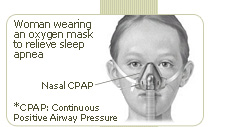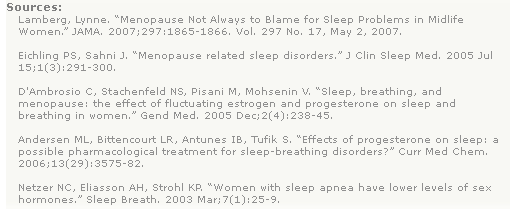34 MENOPAUSE SYMPTOMS |
HEALTH CENTER |
|
| |
|
|
|
Sleep apnea leading cause of sleep problems |
Menopausal women have a well-documented history of suffering from a variety of sleep disorders. Although it has been considered a typically male disorder, medical researchers are becoming more and more interested in obstructive sleep apnea (OSA) as a major cause of troubled sleep in women. Sleep apnea is a sleep disorder condition that involves constricted or interrupted breathing, often resulting in snoring and frequent sleep disruption.
|
|
|
Sleep apnea becomes markedly more frequent and more severe in menopausal and postmenopausal women, mainly due to weight gain and as yet unclear hormonal processes. Recent studies show that progesterone and estrogen hormone therapy may aid in relieving sleep apnea and in improving overall sleep quality in women going through menopause.
|
|
According to a study conducted by Netzer, Eliasson and Strohl, low levels of sex hormones in women are associated with sleep apnea or sleep-disordered breathing. The researchers followed 53 women ranging in age form 24 to 72, measuring their sleep and breathing patterns and hormonal levels (determined from blood samples). They found that women who had the lowest amounts of the hormones progesterone and astradiol had the most severe sleep disorders. |
 |
|
Eichling and Sani state that estrogen is an important factor in restful sleep, but other studies have found that progesterone is just as important a factor. In the article "Effects of progesterone on sleep", researchers describe progesterone as a hormone that plays an important role in several bodily processes, including sleep quality and respiration. The hormone has a soporific affect and strongly stimulates respiration.
Although more studies have focused on the effects of progesterone on sleep apnea in men, research also points to a beneficial effect in menopausal and overweight women.
By Natural-Progesterone-Estrogen-Supplements.com |
 |
|
|
|
|
| |
Copyright� 2008 - - All Rights Reserved |
|
|



